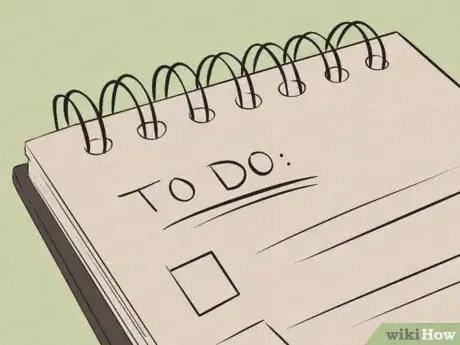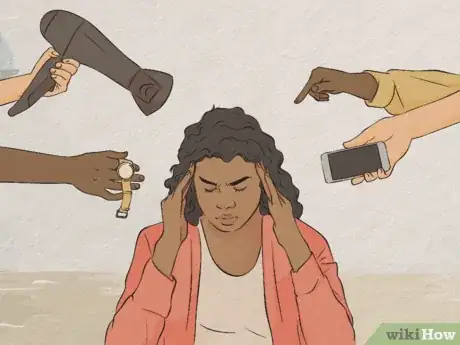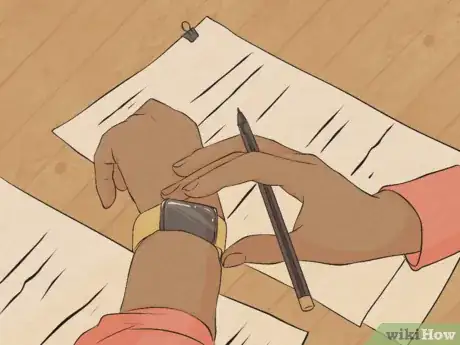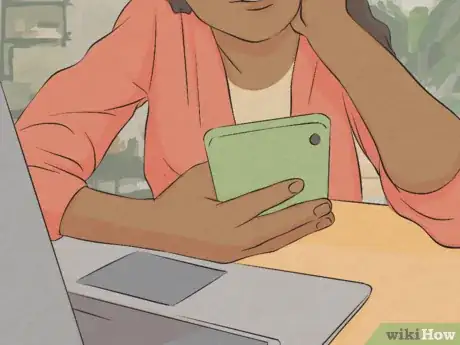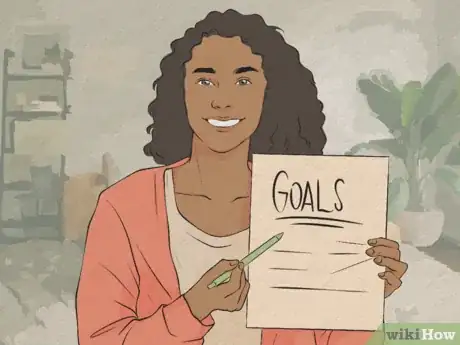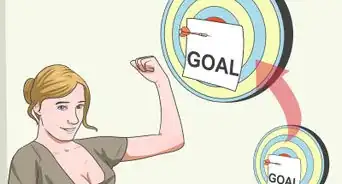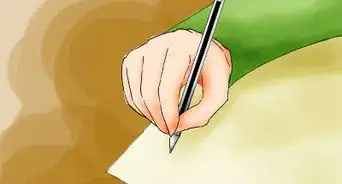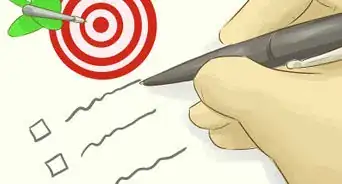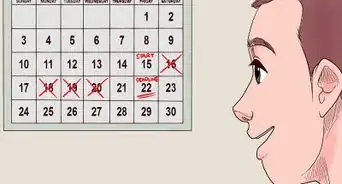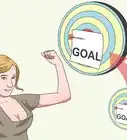wikiHow is a “wiki,” similar to Wikipedia, which means that many of our articles are co-written by multiple authors. To create this article, 20 people, some anonymous, worked to edit and improve it over time.
There are 15 references cited in this article, which can be found at the bottom of the page.
This article has been viewed 55,978 times.
Learn more...
Have you ever wanted to get something done but you can't seem to finish? Maybe you just have a lack of motivation, or maybe distractions are getting the better of you. If you need to buckle down and get something done, a good work environment, strong focus, and dedication are key.
Steps
Before Beginning the Task
-
1
-
2Make a list of all things that need to be done for the day, week, and month. Even though you may just want to do this in your head, actually writing it down has a huge impact.[3]
- Try to be specific and reasonable. For example, don't write 'continue novel' or 'clean house.' Instead, write things such as 'write 500 words' or 'tidy the living room floor.' Small, achievable tasks are best. If you have a big goal in mind, try breaking it down into smaller steps on your list.
- Don't get too distracted by the list. If list-making is taking more time than just getting down to work, put it aside and start being productive.[4]
- If tasks have a deadline, mark them on. This will help you in prioritizing.
- Prioritize the tasks. A simple numbering system works well - you can decide to either prioritize the tasks that need to get done first, or get particularly hard/long tasks out of the way first. Alternative, you might even opt to start with a few shorter/easier tasks so that you can knock a few off the list quickly.
Advertisement -
3Find motivation.
- Shed light on the situation. If it is daytime, open the curtains. If it is night, turn on the brightest lights. This will have a psychological impact on you.[5]
- List all the advantages of completing the goal you have. Come up with as many things as you can. For example, if your goal is to make friends with a colleague, don't just say 'I will have a new friend.' Instead, advantages can include: I can meet people from their social circles; Our work can be more enjoyable; We can learn from each other; They may encourage me on days when I feel unmotivated, etc.
- Tell people when you will be finished by. This is a very powerful tool for getting things done as it increases the pressure on you. Tell as many people as you can and emphasize how good your finished thing shall be.
- Set rewards for yourself.
- Open the windows if you can to let in the fresh air.
-
4Find out if music works for you. Some people prefer to work in silence; others like to have music on. Also, find what type of music is best. While most find relaxing, gentle music best for homework, college assignments, etc; others don't. Most people find that the type of music varies from task to task (e.g. fast music for cleaning or relaxing music for paperwork).[6]
- Remember that you may not be able to play music for the task. For example, you may not be allowed to play music at work/school.
- Try not to play music that you will be tempted to sing along with.
-
5Remove distractions. Distractions can include phones, emails, social media, family etc. Whatever is deterring you from working needs to be removed. If you are being distracted every 15 minutes, you will get little work done because it is impossible to get immediately back to work after a distraction. For most people this takes 5 - 10 minutes.[7]
- Consider letting your family members, coworkers/classmates, or housemates know that you're buckling down to work on something important, so that they won't distract you.
Whilst Working
-
1Do things one at a time. Many people believe that multitasking increases productivity, but the truth is tackling things one at a time will allow you to complete more in less time.[8]
- Break tasks into smaller chunks if needed. One huge job can seem overwhelming, but if you break it down into sections, it becomes more manageable. For example, "write an essay" seems big, but if you start with "brainstorm ideas" and "write a topic sentence," each part becomes a much smaller and more achievable goal.
- As you do each task, check it off your to-do list. This feels great, and can motivate you to keep going down the list.
-
2Take short breaks every hour. The breaks should be no longer than 8-10 minutes. During this time you should stretch and exercise a bit. This will help you come back to the task with more focus, and keep at it for a longer period of time overall.[9]
-
3Eat and drink as needed. In particular, drink lots of water.[10] Your brain and body can only work properly if you are hydrated. While drinks and snacks can be distracting, they also help keep your energy up. If you're thirsty or hungry, don't ignore these feelings - take care of them, and get back to work.
-
4Keep your workspace tidy. This may seem tedious, but a tidy space means a tidy mind.[11]
-
5Resist distractions. This shouldn't be a problem if you've already removed the main distractions before beginning work, but if you hear your phone ring, or get a Facebook alert, ask yourself: is it worth breaking my workflow? If there's something urgent you need to take care of, do, but if it's something you can take care of later, wait for your break.[12]
-
6Remind yourself of the goals and rewards. If you lose site of why you're working so hard, look back at your to-do list and try to refocus on your motivation. If needed, taking a few moments to re-adjust your mindset like this will help you stay on task.
-
7Reward yourself for a job well done. Give yourself the rewards you had promised yourself. Be honest with yourself - if you do not complete the task, do not reward yourself.[13]
Warnings
- If you don't complete something and you don't get the reward and you say to yourself "This is what I get for not getting this done." Don't feel ashamed of yourself.⧼thumbs_response⧽
References
- ↑ https://www.lifehack.org/articles/productivity/how-organize-your-life-10-habits-really-organized-people.html
- ↑ https://www.forbes.com/sites/houzz/2016/01/01/11-clever-ways-to-organize-your-stuff/#6812a1e12803
- ↑ https://greatist.com/happiness/make-a-to-do-list-get-shit-done
- ↑ https://www.forbes.com/sites/ilyapozin/2013/08/14/9-habits-of-productive-people/#194430e52d3f
- ↑ https://www.tcpi.com/wp-content/uploads/2017/12/Psychological-Impact-of-Light-and-Color.pdf
- ↑ https://www.theguardian.com/education/2016/aug/20/does-music-really-help-you-concentrate
- ↑ https://www.lifehack.org/articles/productivity/minimize-distraction-to-get-things-done.html
- ↑ https://www.forbes.com/sites/brianthompson1/2018/12/16/three-simple-steps-you-can-take-to-get-things-done-in-2019/#6488c2776298
- ↑ https://www.psychologytoday.com/us/blog/the-wide-wide-world-psychology/201704/why-and-how-you-should-take-breaks-work
- ↑ https://www.medicalnewstoday.com/articles/290814.php
- ↑ https://www.huffpost.com/entry/7-tips-to-organize-your-work-space-and-stay-productive_b_9792172
- ↑ https://www.lifehack.org/articles/productivity/10-ways-remove-the-distractions-that-keep-you-from-doing-the-best-work.html
- ↑ https://www.developgoodhabits.com/reward-yourself/
- ↑ https://hbr.org/2014/10/what-you-eat-affects-your-productivity
- ↑ https://www.sleep.org/articles/sleep-and-productivity-at-work/
About This Article
If you want to get things done, make a list of everything you need to do. From here, you should prioritize the tasks and highlight any specific deadlines that you'll need to keep in mind. To find the motivation to begin, make sure to optimize your work environment by letting in light and fresh air. You may also want to let other people know when you'll be finished, so the accountability puts a little more pressure on you to get started and keep going. Then, remove any final distractions, such as your phone or social media, and begin working on one task at a time. Every hour, take an 8 to 10-minute break where you stretch a little bit, which will help you return to your work with more focus. For more tips, like how to implement a reward system to help you get things done, scroll down!

